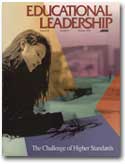In 1979 a key staff member of the Chicago Mastery Learning Project called to report triumphantly that Chicago had discarded its continuous progress policy in favor of new grade-level standards that students had to meet or be retained. He predicted that, because of his project and the new policy, all Chicago students would soon be above grade level in reading and mathematics.
The Chicago project was only partly in accord with Benjamin Bloom's conception of Learning for Mastery. It was basically a materials development project: students who did not learn the first time were given a second set of lessons in which the topic was taught differently. Nothing else was changed; some teachers were still poorly qualified, little funding was available for staff development or manipulative materials, and many students continued to live in poverty surrounded by crime and despair.
After several years of intensive development, Chicago abandoned Mastery Learning as a districtwide program. The decision was as much political as educational; opinions differ on whether it eventually would have produced the results its backers promised.
In this issue of Educational Leadership, we focus on the current campaign to develop formal standards for American education. Someday we will be in a better position to look back and assess the effects of this effort, which emerged very recently but is now seen by many as central to the school reform agenda. As might be expected, most political leaders and members of the public are strongly in favor. On the other hand, thoughtful leaders like Elliot Eisner (p. 22) and Ted Sizer (p. 24) warn that the emphasis on national standards will further erode local initiative and distract us from what is truly most valuable.
Many practicing educators are equally skeptical. They expect to be presented with long lists of subject-matter knowledge that somebody says all kids should know just for the sake of knowing it; they would rather have schools focus on what students can do with what they know. And frankly they are worried that, unless many other changes are made, students will fail to meet unrealistic expectations and the public will once again blame the schools.
That, it seems to me, is the real issue: what will be done to help students reach these new standards? Several documents published in recent years have specified what students should learn in one area or another. All have made a useful contribution, but none has yet had a great deal of effect on practice. Science for All Americans is a sophisticated, readable summary of what the well-educated person should understand about science, mathematics, the social sciences, and technology. Civitas spells out clearly what students need to know to be good citizens. The Curriculum and Evaluation Standards published in 1989 by the National Council of Teachers of Mathematics offers a widely admired model for standards in other subjects. But as Tom Romberg (p. 36), who chaired development of the NCTM standards, notes in this issue, “Only when (they)...are being used in classrooms...will real change begin to occur.”
Committed enthusiasts like Lauren Resnick and Warren Simmons (p. 11 and p.17), architects of the New Standards Project, agree. They recognize that to influence practice, standards must be embodied in assessment tasks, and that to be a positive influence the assessments must “be worth teaching to.” They believe that over time standards and assessments reflecting heightened aspirations will be a powerful lever to lift the quality of learning materials, teacher education, parent support, and all the other elements that together make for excellence.
I sincerely hope it works that way, and I recognize that the outcome depends greatly on the understanding and commitment of individual teachers and administrators. But in the meantime, political leaders must help the public understand the role standards are intended to play in the improvement process—and the changes that must accompany standards if they are to achieve their purpose.
